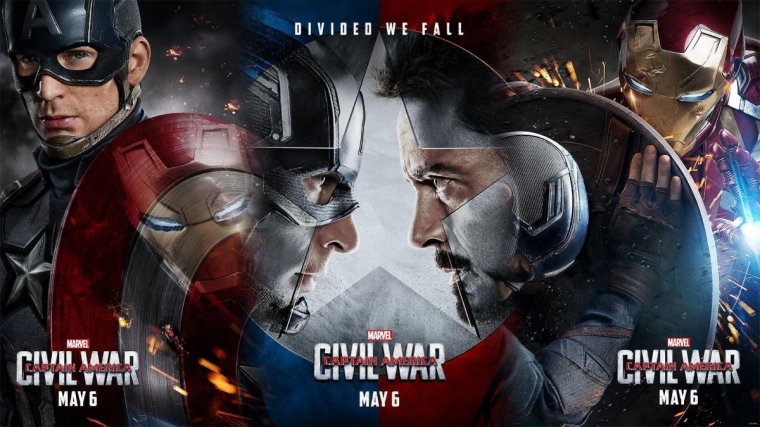REVIEW: Is 'Captain America: Civil War' family friendly? (And what about that superhero-vs.-superhero worldview?)

Warning: This review contains a few spoilers.
CHICAGO (Christian Examiner) -- There is a popular belief among Christian moviegoers about superhero movies, and it goes something like this: Superhero films are popular because all humans innately are looking for a Christ-like figure – that is, an otherworldly being that will save the day, defeat evil and uphold justice.
In other words, even non-Christians are attracted to superhero movies because they, unknowingly, are looking for such a cosmic King.
I hold to this belief, but what do we do when Hollywood gives us movies in which our superheroes are fighting not evil but one another – as is the case with "Captain America: Civil War" (PG-13), which opens this weekend?
Perhaps instead of Christ-like figures we now have a universe of Greek gods and goddesses, who make big mistakes just like we do and who (some would say) are more relatable.
Or maybe the movie is a reflection of our divided political and ideological culture, in which we've split the country into the good guys and the bad guys – is it the Republicans or Democrats? -- and we at times do seem on the verge of a civil war.
Or maybe we've arrived at "Captain America: Civil War" because Hollywood has now made (seemingly) 5,000 superhero movies in the past decade, and we as a culture are simply bored with the superheroes-vs.-the bad guys storyline
Honestly, there's some truth to all of those scenarios, but let's get on to the movie's plot, which is a pretty good one.
Like many Marvel movies, the opening of "Civil War" puts us squarely into a battle scene, with the Avengers – joined together as one – fighting to stop a terrorist group that is seeking to steal an infectious disease from a foreign lab and turn it into a bioweapon. Stopping the bad guys sounds like a worthy goal, but along the way the Avengers – in chasing the bad guys – wreak havoc on the city and leave an unknown number of innocent people dead or injured.
Soon, the U.S. secretary of state meets with the Avengers and delivers some bad news: The nations of the world have turned against you. Sure, he tells them, they're doing lots of good, but they're also ignoring sovereign borders and leaving behind destruction and chaos. (Yep: This film certainly will spark discussion about the limits of and restrictions on war.)
Then the secretary of state delivers even more bad news: 117 members of the United Nations want the Avengers to sign the "Sokovia Accords," which would place the Avengers under U.N. control and limit the times they can and cannot interfere with the world's affairs.
(Warning! Spoilers ahead.)
Tony Stark (Iron Man) — having been confronted by a mom whose son he accidentally killed – agrees to sign it, while Captain America – believing that the Avengers are needed in the world – refuses to do so.
"We try to save as many people as we can," Captain America says at one point before warning that without the Avengers, "Nobody gets saved."
The division between the two men widens when a bombing at the signing of the Sokovia Accords kills 12 people, leading Captain America and his crew wanting to go after and find the perpetrators.
And thus begins the civil war, which dominates the back end of the film and includes a six-on-six superhero battle on an airport runway and a bloody Captain America-vs.-Iron Man fight in the closing scenes.
But let's turn back to the worldview discussion. Despite the fact that our heroes turn on one another, the "Christ-like figure" element is still mostly present in "Civil War." Our heroes continually strive to do the right thing, using their otherworldly powers to bring about justice.
Well, sort of.
Revenge plays a primary role in the final moments of the movie, when one of the superheroes launches into a fit of rage and seeks to kill someone who had murdered his parents decades earlier. It made me uncomfortable, as did the amount of coarse language in "Civil War," particularly for families of small children. (There are about 27 curse words: Jesus' name is abused once; "God" is paired with d--- twice. There are no f-words, but there is plenty of d---, h--, s--- and a--.) Thankfully, there is no sexuality, but there is plenty of violence.
I'd much rather my superheroes be a bit more clean – no revenge, rage or cursing – and from a biblical perspective it does seem a bit odd to be cheering on a superhero who can do everything I cannot do (fly through the air, leap tall buildings) but in the end is exactly like me (sins). But maybe this is a good thing. After all, nothing outside of Scripture can replace the actual Christ figure that is in Scripture. The superheroes of "Civil War" are merely imperfect – OK, really imperfect – symbols. And that's good.
Entertainment rating: 4 Family-friendly rating: 3
Post-movie discussion topics: superheroes – can we use them to point others to Christ?; the ethics of war – what is acceptable and not acceptable in terms of collateral damage?; revenge – is it ever OK?
Michael Foust has covered movies for more than a decade. Follow him on Twitter: @MichaelFoust.